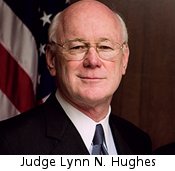Federal Judge Blocks Red Light Camera Removal in Houston, Texas
A federal judge issued an order last Friday blocking the immediate removal of red light cameras from Houston, Texas intersections. On November 2, voters adopted an amendment to the city charter making photo tickets unenforceable, against the wishes of the Houston city council and the private vendor that operates the cameras, American Traffic Solutions (ATS). Over the Thanksgiving holiday, US District Court for the Southern District of Texas Judge Lynn N. Hughes worked out a deal with the city and ATS to preserve the cameras, for now.
“The city of Houston and American Traffic Solutions, Inc, will continue to collect the fines for the traffic violations that occurred through November 15, 2010,” Hughes wrote in his order. “The cameras will not be removed during the pendency of the litigation.”
Hughes had called a colloquy among lawyers for the city — David Feldman and Hope Reh — and the lawyers for ATS — Andy Taylor and George Hittner — on the day after Thanksgiving. Although the city technically filed suit against ATS, the city staff do not want to see the cameras removed any more than ATS does. The parties hashed out a compromise that happened to give ATS everything the firm wanted.
“ATS requests the court to preserve the status quo by enjoining the city from terminating the public safety program or otherwise implementing Proposition 3, pending an adjudication of these fundamental issues of law affecting not only these parties, but the general public at large,” Taylor wrote in its brief to the court filed Wednesday.
The actions in Houston track what happened last year in the city of College Station after voters approved an anti-camera referendum. Attorneys for the city attempted to lose the lawsuit that ATS filed to overturn the result of the public vote. Ultimately, public pressure on elected officials forced the College Station cameras to come down, even though a local judge ruled against the vote. ATS is hoping it can win this time by arguing not only that voters have no right to overturn a city council decision through the charter amendment process, but that no power can take down the red light cameras.
“Both the US Constitution and the Texas Constitution prohibit legislation impairing the obligation of contracts,” Taylor wrote. “The purported charter amendment cannot validly be upheld if doing so would in any way impair the city’s ability to fulfill its pre-existing contractual obligations to ATS.”
Those obligations are iron clad, ATS argued, thanks to the city’s own actions. The firm pointed out that Houston did have a contract provision that would have allowed a “termination for convenience” without financial penalty. Just three days before this provision would have taken effect, the city signed a new agreement with no termination provision in an attempt to avoid a proposed ban on new red light camera contracts, House Bill 300, that passed in the state House but was blocked in the Senate.
“The city, fearful of HB300, did not want to be forced to terminate the agreement upon the passage of a new state law and therefore, removed the termination provisions of the agreement entirely by clearly stating in the amendment that it ‘remains in effect until May 27, 2014,'” Taylor explained. “The city also removed ‘unless sooner terminated under this agreement’ phrase that appeared in the original agreement. Had the city intended to keep its termination options available to it, it could have easily done so.”
Judge Hughes has set a Friday hearing for arguments in the case.
[Courtesy: Thenewspaper.com]
More by The Newspaper
Latest Car Reviews
Read moreLatest Product Reviews
Read moreRecent Comments
- IBx1 Everyone in the working class (if you’re not in the obscenely wealthy capital class and you perform work for money you’re working class) should unionize.
- Jrhurren Legend
- Ltcmgm78 Imagine the feeling of fulfillment he must have when he looks upon all the improvements to the Corvette over time!
- ToolGuy "The car is the eye in my head and I have never spared money on it, no less, it is not new and is over 30 years old."• Translation please?(Theories: written by AI; written by an engineer lol)
- Ltcmgm78 It depends on whether or not the union is a help or a hindrance to the manufacturer and workers. A union isn't needed if the manufacturer takes care of its workers.


































Comments
Join the conversation
@ Greg Locock "...most vehicles stop in a time that is set by this formula" I find no comfort knowing that (apparently to some) a satisfactory metric is 51% of the vehicles should be able to stop. This implies about half can and half cannot without panic braking if they are at the decision point when the light changes. Respecting this is about human safety, I and most safety engineers I know would say 85-90% in real-world conditions is a far better metric. Quick yellows do not give you time to stop and they do not give you time to get through the intersection. That is why quick yellows are so dangerous.
I hear that in England a burning tire hung around the offending device works wonders to enforce the will of the people, not that anyone should do that. Just sayin'